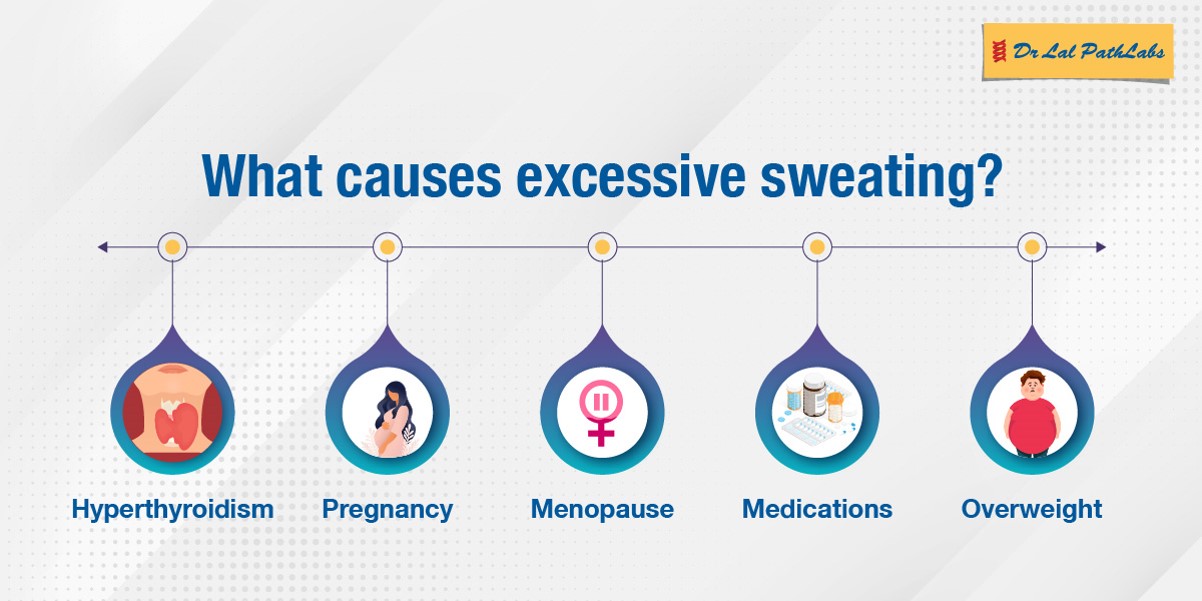Excessive Sweating: Types, Causes, Symptoms & Diagnosis
Introduction
Sweating is a natural bodily function that helps regulate body temperature and eliminate toxins. However, for some individuals, sweating can become an overwhelming and distressing concern. Excessive sweating, or hyperhidrosis, goes beyond the typical perspiration response and can significantly impact one’s quality of life.
Types of Excessive Sweating
Excessive sweating can be categorized into two main types:
-
Primary Hyperhidrosis
This type of hyperhidrosis is localized and often hereditary. It primarily affects specific areas such as the palms, soles of the feet, underarms, and sometimes the face. People with primary hyperhidrosis tend to sweat excessively in these areas, regardless of temperature or emotional state.
-
Secondary Hyperhidrosis
Unlike primary hyperhidrosis, secondary hyperhidrosis is triggered by an underlying medical condition or external factors. It can affect the entire body and usually emerges later in life. Medical conditions such as thyroid disorders, diabetes, menopause, and certain infections can lead to secondary hyperhidrosis.
Causes of Excessive Sweating
The causes of excessive sweating can vary, and they depend on whether the condition is primary or secondary in nature:
Primary Hyperhidrosis Causes: The exact cause of primary hyperhidrosis remains elusive, but it is often believed to be linked to overactive sweat glands. Genetic factors also play a significant role, as the condition often runs in families. Emotional triggers and stress can exacerbate primary hyperhidrosis but aren’t considered direct causes.
Secondary Hyperhidrosis Causes: Secondary hyperhidrosis is typically a result of an underlying medical condition, which can include:
- Medical Disorders: Conditions like thyroid disorders, diabetes, and certain neurological disorders can lead to excessive sweating.
- Infections: Tuberculosis, HIV, and other infections can cause profuse sweating, especially during sleep.
- Menopause: Hormonal changes during menopause can lead to sudden and intense episodes of sweating, often referred to as hot flashes.
- Medications: Some medications, such as antidepressants, antipsychotics, and certain blood pressure drugs, may cause excessive sweating as a side effect.
- Obesity: Overweight individuals may experience increased sweating due to the body’s need to cool itself more effectively.
- Cancer: Certain cancers, like lymphoma, can lead to excessive sweating, particularly during the night.
Symptoms of Excessive Sweating
Excessive sweating goes beyond the ordinary dampness caused by physical activity or heat. Some common symptoms include:
- Visible Sweat: Noticeable sweating that often soaks through clothing, making social interactions uncomfortable.
- Frequent Clamminess: Hands, feet, or underarms feeling excessively clammy, even without apparent triggers.
- Skin Irritation: Constant moisture can lead to skin irritation, which might manifest as rashes or fungal infections.
- Social and Emotional Impact: Excessive sweating can lead to embarrassment, social withdrawal, and emotional distress.
Diagnosis of Excessive Sweating
Diagnosing excessive sweating involves a comprehensive approach that considers medical history, physical examination, and sometimes additional tests:
- Medical History: The doctor will inquire about your sweating patterns, triggers, and any underlying medical conditions.
- Physical Examination: The doctor will assess the areas affected by excessive sweating and look for potential signs of an underlying condition.
- Lab Tests: In cases of secondary hyperhidrosis, the doctor may order blood tests to identify any underlying medical issues.
Conclusion
Excessive sweating can be a challenging condition to live with, affecting both physical comfort and emotional well-being. Understanding the types, causes, symptoms, and diagnostic methods is crucial for seeking appropriate treatment and management. Whether primary or secondary, addressing the root cause of excessive sweating can greatly improve an individual’s overall quality of life. If you suspect you’re experiencing excessive sweating, it’s advisable to consult a healthcare professional who can guide you toward an accurate diagnosis and effective treatment plan.














